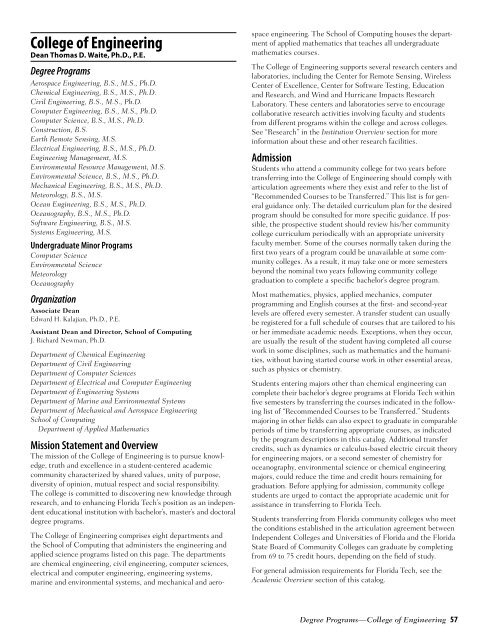2008–2009 - Florida Institute of Technology
2008–2009 - Florida Institute of Technology
2008–2009 - Florida Institute of Technology
Create successful ePaper yourself
Turn your PDF publications into a flip-book with our unique Google optimized e-Paper software.
College <strong>of</strong> engineering<br />
Dean Thomas D. Waite, Ph.D., P.e.<br />
Degree Programs<br />
Aerospace Engineering, B.S., M.S., Ph.D.<br />
Chemical Engineering, B.S., M.S., Ph.D.<br />
Civil Engineering, B.S., M.S., Ph.D.<br />
Computer Engineering, B.S., M.S., Ph.D.<br />
Computer Science, B.S., M.S., Ph.D.<br />
Construction, B.S.<br />
Earth Remote Sensing, M.S.<br />
Electrical Engineering, B.S., M.S., Ph.D.<br />
Engineering Management, M.S.<br />
Environmental Resource Management, M.S.<br />
Environmental Science, B.S., M.S., Ph.D.<br />
Mechanical Engineering, B.S., M.S., Ph.D.<br />
Meteorology, B.S., M.S.<br />
Ocean Engineering, B.S., M.S., Ph.D.<br />
Oceanography, B.S., M.S., Ph.D.<br />
S<strong>of</strong>tware Engineering, B.S., M.S.<br />
Systems Engineering, M.S.<br />
Undergraduate Minor Programs<br />
Computer Science<br />
Environmental Science<br />
Meteorology<br />
Oceanography<br />
Organization<br />
Associate Dean<br />
Edward H. Kalajian, Ph.D., P.E.<br />
Assistant Dean and Director, School <strong>of</strong> Computing<br />
J. Richard Newman, Ph.D.<br />
Department <strong>of</strong> Chemical Engineering<br />
Department <strong>of</strong> Civil Engineering<br />
Department <strong>of</strong> Computer Sciences<br />
Department <strong>of</strong> Electrical and Computer Engineering<br />
Department <strong>of</strong> Engineering Systems<br />
Department <strong>of</strong> Marine and Environmental Systems<br />
Department <strong>of</strong> Mechanical and Aerospace Engineering<br />
School <strong>of</strong> Computing<br />
Department <strong>of</strong> Applied Mathematics<br />
Mission Statement and Overview<br />
The mission <strong>of</strong> the College <strong>of</strong> Engineering is to pursue knowledge,<br />
truth and excellence in a student-centered academic<br />
community characterized by shared values, unity <strong>of</strong> purpose,<br />
diversity <strong>of</strong> opinion, mutual respect and social responsibility.<br />
The college is committed to discovering new knowledge through<br />
research, and to enhancing <strong>Florida</strong> Tech’s position as an independent<br />
educational institution with bachelor’s, master’s and doctoral<br />
degree programs.<br />
The College <strong>of</strong> Engineering comprises eight departments and<br />
the School <strong>of</strong> Computing that administers the engineering and<br />
applied science programs listed on this page. The departments<br />
are chemical engineering, civil engineering, computer sciences,<br />
electrical and computer engineering, engineering systems,<br />
marine and environmental systems, and mechanical and aero-<br />
space engineering. The School <strong>of</strong> Computing houses the department<br />
<strong>of</strong> applied mathematics that teaches all undergraduate<br />
mathematics courses.<br />
The College <strong>of</strong> Engineering supports several research centers and<br />
laboratories, including the Center for Remote Sensing, Wireless<br />
Center <strong>of</strong> Excellence, Center for S<strong>of</strong>tware Testing, Education<br />
and Research, and Wind and Hurricane Impacts Research<br />
Laboratory. These centers and laboratories serve to encourage<br />
collaborative research activities involving faculty and students<br />
from different programs within the college and across colleges.<br />
See “Research” in the Institution Overview section for more<br />
information about these and other research facilities.<br />
Admission<br />
Students who attend a community college for two years before<br />
transferring into the College <strong>of</strong> Engineering should comply with<br />
articulation agreements where they exist and refer to the list <strong>of</strong><br />
“Recommended Courses to be Transferred.” This list is for general<br />
guidance only. The detailed curriculum plan for the desired<br />
program should be consulted for more specific guidance. If possible,<br />
the prospective student should review his/her community<br />
college curriculum periodically with an appropriate university<br />
faculty member. Some <strong>of</strong> the courses normally taken during the<br />
first two years <strong>of</strong> a program could be unavailable at some community<br />
colleges. As a result, it may take one or more semesters<br />
beyond the nominal two years following community college<br />
graduation to complete a specific bachelor’s degree program.<br />
Most mathematics, physics, applied mechanics, computer<br />
programming and English courses at the first- and second-year<br />
levels are <strong>of</strong>fered every semester. A transfer student can usually<br />
be registered for a full schedule <strong>of</strong> courses that are tailored to his<br />
or her immediate academic needs. Exceptions, when they occur,<br />
are usually the result <strong>of</strong> the student having completed all course<br />
work in some disciplines, such as mathematics and the humanities,<br />
without having started course work in other essential areas,<br />
such as physics or chemistry.<br />
Students entering majors other than chemical engineering can<br />
complete their bachelor’s degree programs at <strong>Florida</strong> Tech within<br />
five semesters by transferring the courses indicated in the following<br />
list <strong>of</strong> “Recommended Courses to be Transferred.” Students<br />
majoring in other fields can also expect to graduate in comparable<br />
periods <strong>of</strong> time by transferring appropriate courses, as indicated<br />
by the program descriptions in this catalog. Additional transfer<br />
credits, such as dynamics or calculus-based electric circuit theory<br />
for engineering majors, or a second semester <strong>of</strong> chemistry for<br />
oceanography, environmental science or chemical engineering<br />
majors, could reduce the time and credit hours remaining for<br />
graduation. Before applying for admission, community college<br />
students are urged to contact the appropriate academic unit for<br />
assistance in transferring to <strong>Florida</strong> Tech.<br />
Students transferring from <strong>Florida</strong> community colleges who meet<br />
the conditions established in the articulation agreement between<br />
Independent Colleges and Universities <strong>of</strong> <strong>Florida</strong> and the <strong>Florida</strong><br />
State Board <strong>of</strong> Community Colleges can graduate by completing<br />
from 69 to 75 credit hours, depending on the field <strong>of</strong> study.<br />
For general admission requirements for <strong>Florida</strong> Tech, see the<br />
Academic Overview section <strong>of</strong> this catalog.<br />
Degree Programs—College <strong>of</strong> Engineering 57

















